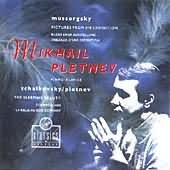Purists may raise an eyebrow or two over Mikhail Pletnev’s myriad textual changes, including pronounced extremes of dynamics, voicing, and phrasing throughout Mussorgsky’s Pictures at an Exhibition. Yet his compulsively worked out pianism invariably zeros in on the music’s elemental and spiritual core. Who cares about a lone, minuscule finger slip in the opening, rather austerely shaped Promenade when each pitch rings out like a proclamation from on high? If you think that piano notes can’t bend, just listen to the creepy trills Pletnev fashions out of Gnomus’ plain melodic octaves. His extraordinary melody/accompaniment separation in The Old Castle gives the illusion of two distinct instruments, while Tuileries and Bydlo share a common, moderate tempo (many interpreters drag the latter’s oxcarts into the mud). Likewise, the extra breathing room Pletnev allots to the Ballet of the Unhatched Chicks and the Marketplace at Limoges allows for greater textural interplay between the hands.
Incidentally, Pletnev follows Ravel’s orchestral version of Pictures and omits the Promenade before Limoges. During Baba Yaga’s final interlocking octave onslaught, Pletnev appears to sustain the sonorities with the middle pedal so that they bleed into the Great Gate at Kiev’s opening measures. When the Promenade’s theme triumphantly returns, Pletnev delays the tolling left-hand notes just a split second after the beat. I mention these unorthodox details because they convincingly evoke the spatial effect of distant bells and are thoroughly in keeping with the music’s grand, uplifting sensibility.
Although many pianists have taken up Pletnev’s transcription of excerpts from Tchaikovsky’s Sleeping Beauty, few if any can match the transcriber’s rich orchestral sonority, virtuosic élan, and natural instinct for balletic timing. Listen to Little Red Riding Hood’s deliciously varied accentuations, Danse des Pages’ miraculously poised double notes, and notice how the finale’s thick chords never sound clotted or muddy. One also must mention Virgin Classics’ gorgeous engineering. Now that this remarkable 1989 recital is available once again via Arkivmusic.com’s on-demand reissue program, what are you waiting for?
































